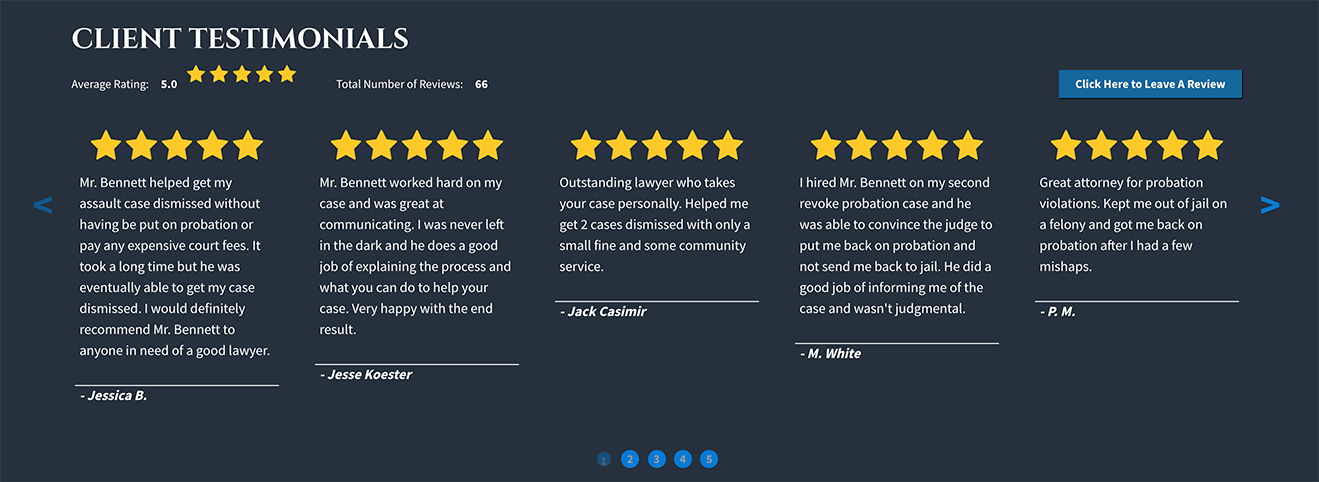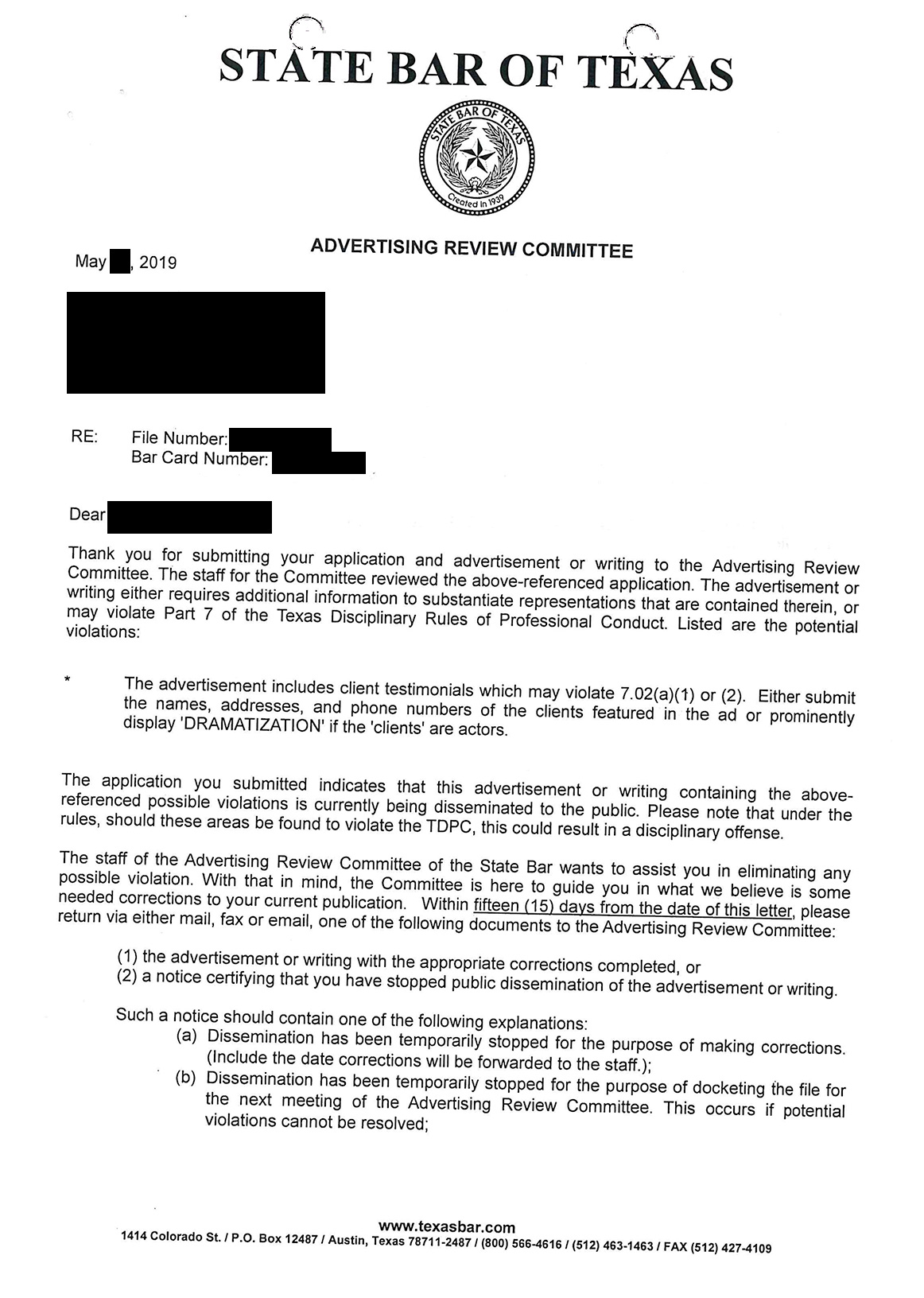State Bar of Texas’ Arbitrary Rule for Testimonials on Law Firm Websites

Online reviews are everywhere these days. For law firms, the most common avenues for online reviews include: Facebook, Yelp, Avvo, and of course… Google. These are known as “third-party” reviews because they are posted to a website other than the law firm’s website. What we are all seeing much more commonly now, are what we call “first-party” reviews. These are reviews posted directly to the law firm’s website.
When it comes to the State Bar of Texas Rules for Lawyer Advertising, reviews are being scrutinized by the Advertising Review Committee in a way that doesn’t actually protect consumers from being misled, presents an unfair burden to Texas attorneys, and raises serious concerns about attorney-client confidentiality.
- Why Reviews Are So Common on Law Firm Websites
- The State Bar of Texas’ Advertising Review Committee is Threatening Texas Lawyers
- The Advertising Review Committee is Misinterpreting the Rule
- Case Results vs. Client Reviews
- Reviews on a Law Firm’s Website are Considered to be “Sponsored” by the Lawyer
- How the Advertising Review Committee Interprets “False or Misleading”
- Why They’re Wrong
- Lawyers are Being Forced to Violate their Client’s Privacy
- How the State Bar of Texas Processes the Submissions
- How the State Bar of Texas Should Improve this Process
- Conclusion: The Advertising Review Committee needs to stop requiring lawyers to submit their client’s identifying information
Why Reviews Are So Common on Law Firm Websites
One of the main reasons for the increase in first-party reviews, is Google’s displaying of these reviews directly in search results. You’ve probably seen this, the little stars displayed along with the organic search result.
Because of this, it’s become common practice for client reviews to be displayed directly on a law firm’s website. This is usually done through a widget. One of the most common, is Yext Reviews. This widget can be incorporated directly into your Yext listing and installed on your WordPress website. It is displayed on some of the interior pages on your website and feeds directly into Google. It also allows consumers to post a review directly to the law firm’s website, the same way they would on a third-party site. Notice the button “Click here to leave a review.”
Another major reason that law firms are doing this is because many of their competitors are doing it! If my competitors have 5 little orange stars in Google’s organic search results, why shouldn’t I?
The State Bar of Texas’ Advertising Review Committee is Threatening Texas Lawyers
As far as I know, no other state is doing this. Only Texas.
An attorney’s reputation is everything, and poor marks from the State Bar can be detrimental to one’s career. One of the most common notifications law firms are receiving from the State Bar of Texas is for potential advertising violations having to do with the attorney’s website and specifically the client reviews and testimonials that appear on the site.
What the Advertising Review Committee is doing:
- Choosing law firms at random and reviewing their websites for potential advertising violations
- Printing the website onto pieces of paper and scribbling each potential violation onto the paper by hand with a red pen
- Typing up a threatening letter via typewriter and then pressing each piece of paper with an old-school heavy duty 2+hole+punch
- Scanning each piece of paper to create a PDF file that doesn’t contain any readable text and is often 8 or 9 Megabytes in size
- Sending this PDF file to the law firm with a 15-day deadline to comply
If you’re a lawyer in Texas and you have a website, either this has already happened to you, or there’s a good chance it will in the future. The letter looks something like this:
Since the State Bar of Texas doesn’t know how to create a PDF file containing readable text, we went ahead and transcribed it for you here.
For any practicing attorney, receiving official correspondence from a state licensing authority is no joke. The 15-day deadline presents an unfair burden on the attorneys. This causes a huge amount of stress for the individual lawyer whose bar number is on that letter.
The Advertising Review Committee is Misinterpreting the Rule
When it comes to client testimonials, the Advertising Review Committee is getting it wrong, every time. For the violations having to do with client reviews displayed on the lawyer’s website, they always cite rule 7.02 (a)(1) or (2) as follows:
- The advertisement includes client testimonials which may violate 7.02(a)(1) or (2). Either submit the names, addresses, and phone numbers of the clients featured in the ad or prominently display ‘DRAMITIZATION’ if the ‘clients’ are actors.
Now, let’s take a look and see what Rule 7.02(a)(1) and (2) actually says. From the Texas Disciplinary Rules of Professional Conduct:
Rule 7.02 Communications Concerning a Lawyer’s Services
-
- A lawyer shall not make or sponsor a false or misleading communication about the qualifications or the services of any lawyer or firm. A communication is false or misleading if it:
- contains a material misrepresentation of fact or law, or omits a fact necessary to make the statement considered as a whole not materially misleading;
- contains any reference in a public media advertisement to past successes or results obtained unless
- the communicating lawyer or member of the law firm served as lead counsel in the matter giving rise to the recovery, or was primarily responsible for the settlement or verdict,
- the amount involved was actually received by the client,
- the reference is accompanied by adequate information regarding the nature of the case or matter and the damages or injuries sustained by the client, and
- if the gross amount received is stated, the attorney’s fees and litigation expenses withheld from the amount are stated as well;
- A lawyer shall not make or sponsor a false or misleading communication about the qualifications or the services of any lawyer or firm. A communication is false or misleading if it:
First, notice that the rule doesn’t say anything about “client testimonials” although the letter says “client testimonials which may violate 7.02(a)(1) or (2)”
Second, notice that the rule doesn’t say anything about “submitting the names, addresses, and phone numbers of the clients featured” as stated in the letter.
Case Results vs. Client Reviews
This rule is actually more appropriate as it applies to case results than client reviews. The difference is, with case results, the lawyer is making the statement. With client reviews, an internet user, presumably someone who has consulted with and/or hired the firm or an attorney within the firm, is making the statement.
- 7.02(a)(2) refers specifically to “any reference to past successes or results obtained” unless (i) the… lawyer… served as lead counsel in the matter…”
So what the rule means, is that, when a lawyer makes a statement about results obtained in a specific case, it’s ok as long as they served as lead counsel in the matter and can provide information to support this.
For case results, providing the information to support this is often as simple as displaying a cause number, date, attorney of record and/or county or court where the case was handled. For cases results in which this information is not displayed, the State Bar of Texas would not be unreasonable to ask for the client’s name, to confirm that the attorney “served as lead counsel in the matter” but probably not the address and phone number as that information would not be necessary information to support this. Considering that the lawyer is the one making the statement, and has presumably received permission from the client to post a summary of the case result on their website, even though they aren’t displaying the client’s name publicly, it wouldn’t be an issue to provide the name to the State Bar of Texas because the lawyer would definitely know who each of these clients are.
For reviews however, requiring the lawyer to submit identifying information for each client is not appropriate and often very difficult to comply with, because:
- The lawyer is not actually making the statement;
- Consumers understand the nature of online reviews;
- It’s impossible for the lawyer to know for sure who posted each review;
- The content of the review typically does not contain unique enough information to clue the lawyer as to who posted it; and
- The review was posted with a presumption of anonymity
Reviews on a Law Firm’s Website are Considered to be “Sponsored” by the Lawyer
- 7.02(a) says “A lawyer shall not make or sponsor a false or misleading communication about the qualifications or services of any lawyer…”
So the lawyer doesn’t have to make the false or misleading statement if they just “sponsor” it. The State Bar of Texas doesn’t have an issue with third-party reviews because the lawyer is not technically sponsoring the content. But if the lawyer copies the third-party review from the source, let’s say Avvo, and displays it on their website, even if they link to the source and clearly state that it is a “review from an Avvo user,” the State Bar of Texas will treat this review as a statement that was sponsored by the lawyer. The term “sponsored” would typically mean that the lawyer paid the person to make the statement which obviously is not the case when it comes to online reviews. The State Bar of Texas treats anything that is on the lawyer’s website as being “sponsored” by the lawyer because the lawyer is paying for the website to be hosted.
How the Advertising Review Committee Interprets “False or Misleading”
Let’s take a look at how they define “false or misleading”
- 7.02(a) A communication is false or misleading if it:
- (1) contains a material misrepresentation of fact or law; or
- (1) omits a fact necessary to make the statement considered as a whole not materially misleading;
- (2) contains any reference… to past successes or results obtained;
- (2) unless (i) (ii) (iii) or (iv)
By these standards, virtually any communication that contains any sort of subjective statement at all could be considered “false or misleading.” Any sort of subjective statement expressing an opinion, or summarizing a story, that omits even one fact, regardless of how insignificant, very well could be considered to be “false or misleading.” Despite the obvious First Amendment concerns with the rule itself, I believe the rule is being mis-interpretation and applied incorrectly as it relates to client reviews.
Ultimately, the Advertising Review Committee’s position is that all client reviews and testimonials are always misleading. Every single one of them, no matter what. The very idea of a user-generated testimonial discussing satisfaction or dissatisfaction with the lawyer’s services, by nature, is inherently misleading. What they are saying, is that consumers cannot be trusted to not be misled by user-generated reviews and testimonials.
Why They’re Wrong
Consumers see online reviews everywhere. Whether they’re considering which restaurant to have dinner at, which plumber to hire, or which vacuum cleaner to purchase. They will see ratings and reviews online virtually everywhere they turn.
Consumers know that these reviews are user-generated. They know that the content of the review is subjective, solely the opinion of the individual who posted it, and they know that online reviews must be taken with a grain of salt.
Consumers inherently know this, they’re used to it as they deal with it every day. They know that online reviews are only one small factor of many that will impact their purchasing decisions.
Consumers don’t need to be coddled to the point that they aren’t trusted to understand that user-generated online reviews are, by nature, un-verified and non-factual. They don’t need to be protected from reading information posted by those who came before them.
Lawyers are Being Forced to Violate their Client’s Privacy
If a lawyer wants to have any client testimonials on their website, they must submit identifying information, the name, address, and phone number, of each client who has posted a review, to the State Bar of Texas. This is a violation of the attorney-client relationship and an invasion of the client’s privacy and confidentiality.
Reviews are supposed to be anonymous and only contain identifying information at the sole discretion of the individuals who create them. Especially when it comes to legal issues in which disclosure of such information may be embarrassing, potentially harmful to one’s reputation, or potentially a violation of a legal agreement. The reason why so many consumers prefer to post reviews to Avvo.com is because those reviews can be completely anonymous. Unlike Google or Facebook, Avvo does not even require the user to create an account.
Consider this scenario
Think about a situation in which someone was falsely accused of an egregious crime, the case went to trial, and a not guilty verdict was delivered. The records relating to that case were later expunged. The person is extremely thankful to the attorney who performed the work and decides to post an anonymous review online to express satisfaction and gratitude. The attorney displays this information on his or her website as is standard practice. All the attorney’s competitors have reviews on their websites, so the attorney assumes there is nothing wrong in doing so.
The attorney then receives a threatening letter from the State Bar of Texas Advertising Review Committee demanding they either delete all client reviews from their website or submit identifying information for each client who posted a review. The attorney may not know exactly who posted every single review on their site, but they remember this particular case and they know with near certainty the individual who posted this review. They also know this individual’s wish is to remain anonymous. Now they are faced with a dilemma, either oust the person who was accused of an egregious crime by identifying them to the State Bar of Texas or remove the review from the website and be at a competitive disadvantage online.
The attorney feels that the State Bar of Texas is trustworthy and decides to be honest and submit the identifying information. After all, that’s what other lawyers are doing.
A person who works with the Advertising Review Committee receives the submission and something catches their eye. They recognize the name of the individual who posted the review. It’s someone they know, maybe they grew up in the same neighborhood, went to school together or have mutual friends. Out of curiosity, they can’t help but read the review and become aware of some of the details of the person’s case. The content of the review contains details about the case that cannot be found anywhere else. Records relating to the case have already been expunged.
The client has a reasonable expectation of privacy that the review they created was completely anonymous. Unfortunately, someone who knows them is now fully aware of their identity as the person who wrote this information and posted it online. At this point, the client’s privacy has been severely violated in a way that undermines everything we know attorney-client privilege to be.
Now, this scenario may seem unlikely, but when it comes to attorney-client privilege and confidentiality, user privacy is supposed to be protected against the most unlikely of scenarios.
How the State Bar of Texas Processes the Submissions
So what exactly does the Advertising Review Committee do with the clients identifying information once it’s been submitted?
We don’t know for sure, but from what I can assume from working through this situation with about a dozen law firms, the answer is simple. Nothing. They probably just stick it in a file somewhere and shove it into a file cabinet.
- They don’t verify that it’s correct
- They don’t contact any of the individuals
- They don’t verify that there is a real case, or even that it’s a real person
- They don’t even verify that the number of names submitted matches the number of reviews on the lawyer’s website
Once the list of names, addresses and phone numbers is submitted, they are satisfied, and life goes on.
So if they don’t actually do anything with the information, what’s the point?
There is no point. The entire process is completely pointless as it doesn’t actually protect consumers.
How do lawyers comply with such a pointless and arbitrary requirement?
Most lawyers simply compile a list of their clients’ names, addresses, and phone numbers and submit it just as the letter asks. Even if the list is not the same exact people who actually created the reviews. Again, it may be impossible for the lawyer to know exactly who created every review. They can guess, and that’s what most of them are doing.
This may seem like a small task for most lawyers, but it becomes especially problematic for larger law firms with 50, 100, 200 or even more reviews on their site. For busy law firms, it’s virtually impossible to do all of this within only 15 days. I’ve seen instances where lawyers have become very stressed out by the situation and decided to just delete all the reviews from their site. This is extremely unfair considering that first-party reviews are now the norm of the internet. So, unless lawyers are willing and able to compile identifying information about their clients and submit the information, they may have to say goodbye to those 5 little orange stars in Google’s search results.
I’ve satisfied the State Bar of Texas, but have since added more testimonials to my site, should I submit my site for review?
I don’t recommend voluntarily submitting your website to the State Bar of Texas Advertising Review Committee every time you make changes or additions to the site. If you are launching a brand new website, you should follow the Mandatory Submission Steps. Additionally, they may review your site on their own. If they don’t, you aren’t going to get in trouble for not having submitted it. If they do, it’s either because they chose your site at random, or because one of your competitors reported your site for potential violations. When this happens, you will receive correspondence. This can be a stressful situation for a busy lawyer. You should make every effort to edit your site to satisfy all of the “potential advertising violations” indicated in the letter and then submit your site to them within the 15-day deadline.
How the State Bar of Texas Should Improve this Process
The State Bar of Texas should ensure that consumers are not being blatantly misled by lawyer advertisements without causing undue stress to Texas lawyers or violating attorney-client privilege. They should allow client reviews to be displayed on law firm websites without requiring identifying information of the individuals who posted the reviews.
As long as the website clearly states “Client Reviews” or “Client Testimonials” along with the information, the consumers will inherently know the nature of such information and there is no risk of them being misled by it. To further ensure that consumers understand the nature of the information contained here, the website could include a disclaimer. Something like this:
Client Reviews
The following section contains user-generated client reviews and testimonials. Before reading further, please understand each of the following:
- The content of each review was created by an individual and is the sole opinion of that individual
- Some reviews may describe legal scenarios that the individual experienced and then later recollected and may not be entirely accurate or contain all facts about the situation
- Lawyers do not have control of the content of reviews posted here
- The outcome of past cases is not a guarantee of the outcome of any future case
- Each case is unique and must be evaluated and handled on its own merit
Conclusion: The Advertising Review Committee needs to stop requiring lawyers to submit their client’s identifying information
It’s a completely pointless requirement attempting to deal with a non-issue in the most complicated and stressful way possible. Instead, they should focus on communications that are truly misleading, blatantly false, or obviously a violation and therefore unfair to other lawyers. Client reviews are the norm and as long as the content is clearly designated as such, it’s not unfair for lawyers to display them.
As long as the information is clearly designated as “client reviews” it cannot be construed as misleading. At the very most, the State Bar could require lawyers to include a disclaimer, but I don’t even feel that is necessary. Consumers already know what a client testimonial is and what it isn’t.
The threatening letters need to stop. The filing of long lists of client’s names, addresses and phone numbers, despite potentially being a gross invasion of privacy and undermining of attorney-client privilege, is completely non-sensical and accomplishes absolutely nothing.
Unfortunately, state licensing organizations like the State Bar of Texas are very slow to implement improvements once they’ve decided on how they will enforce a particular issue. What needs to happen and what I believe will happen, at some point, is that a lawyer or group of lawyers will challenge the State Bar of Texas on this issue.










I am having this issue. Can you I get information for an attorney to hire to take care of this issue for me. The State Bar is asking for information from client reviews on my Facebook account. If I do not provide it they want me to take the review down. The only issue is Facebook does not allow me to take down reviews. I can see why. Then every business will have a 5 star rating if businesses could pick and choose what reviews they put on Facebook.